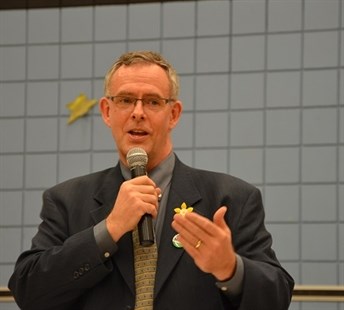
At last week's education forum for candidates in the Kelowna-Mission riding, Mike McLoughlin explained how the B.C. Conservatives would eliminate the Carbon Tax which he calls a regressive tax that hurts the province's economy.
(JULIE WHITTET / iNFOnews.ca)
May 03, 2013 - 12:47 PM
A trip to Mike McLoughlin's campaign headquarters feels a lot like a visit to the doctor's office. That's because for the past few months local conservatives candidates have been working out of a medical clinic.
McLoughlin says he opened the Rutland clinic with his wife in 2008, along with a clinic at the Real Canadian Superstore, his wife being a doctor and he managing the business. But in the past couple years the clinic has run out of steam, or more precisely, doctors.
“I decided to become a candidate around this time last year when it looked like we had to close this clinic because we couldn't recruit any more physicians, I just got fed up,” he says and remembers thinking, "this is ridiculous - how can you have a problem recruiting physicians to Kelowna?”
He says the failure of his clinic points to a wider trend in Kelowna: the city can't seem to hang on to its family physicians.
“Doctors here get paid the same as in Lower Mainland, but in the Lower Mainland they have access to more services and capacity than you would here,” he says. Of the 15 family doctors he brought to his first clinic Med-i-Cal, most have moved on to other positions in Kelowna or to positions with a better salary. McLoughlin says in the last year alone Kelowna has lost close to 20 family physicians.
“There's not as much incentive to be a family doctor in a rural community, a lot of family doctors will migrate to the larger centres,” he says, leaving remaining physicians to bear the brunt of working longer hours.
McLoughlin says the shortage has a direct impact on Kelowna's healthcare system and the patients who use it. Patients end up cycling in and out of hospitals and walk-in clinics, when they should be seeing doctors.
“Re-admission rates are higher by about twice in Kelowna than they are say in Vancouver,” he says. McLoughlin and his wife see this first-hand when the patients end up in their walk-in clinic.
“Someone who's had a substance issue, they get discharged from the hospital, then they end up in our walk-in clinic to have their medication continued,” he says. “But the kind of care we're able to provide on a walk-in basis isn't the appropriate kind of care, they need to have a family doctor to look after them on a long-term.”
McLoughlin believes this explains why the availability of addiction treatment centres is so critical right now.
“Crossroads is closing and who's going to take over for them?” he says.
Interior health will soon be announcing a new contract to replace Crossroad's residential facility but McLoughlin suspects it won't offer the same level of service.
“So who does that fall upon? It's the family doctors who the patients go to when they have nowhere else to go,” he says and suggests it's time for Kelowna to follow the lead of Kamloops by actively seeking family physicians.
His other suggestion is changing the medical programs currently offered by Kelowna universities.
"The problem is only 20% of students commit to family medicine. Most will go into specialist medicine because you get paid a lot better.”
In the future he thinks students coming to Kelowna to study medicine should be training as family doctors, leaving other skills training to bigger cities like Vancouver.
And this is where the B.C. Conservatives come in. Rather than following the lead of representatives from Victoria, the B.C. Conservative Party promises to give local governments the ability to decide how doctors are recruited.
“We represent our constituents first," McLoughlin says. "Steve Thomson represents Victoria to Kelowna, I would represent Kelowna to Victoria.”
He also emphasizes the B.C. Liberal Party, a century-old political party, is very different from the federal Conservative leadership brought in 2004.
“When John Cummins quit the federal conservatives he disagreed with a lot of what was going on at the federal level as it affected British Columbia," he says. Cummins is taking a stand for B.C. against policies like last year's omnibus budget bill, which cut out regulations for the fisheries department. He says Cummins is also fighitng the temporary foreign workers program in the province.
“He's brought a B.C. Conservative party which was moribund and brought it to life.”
To contact the reporter for this story, email Julie Whittet at jwhittet@infotelnews.ca or call (250)718-0428.
News from © iNFOnews, 2013